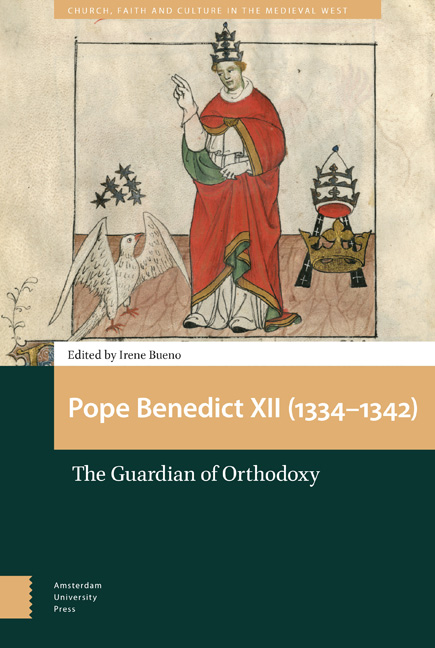Book contents
- Frontmatter
- Contents
- Abbreviations
- List of Illustrations
- Introduction: Benedict XII, the Guardian of Orthodoxy
- 1 Jacques Fournier and Thirteenth-Century Inquisitorial Methods
- 2 Recovering a Theological Advice by Jacques Fournier
- 3 Benedict XII and the Beatific Vision
- 4 A New Seat for the Papacy: Benedict XII, Avignon, and the Comtat Venaissin
- 5 In the Footsteps of St Peter: New Light on the Half-Length Images of Benedict XII by Paolo da Siena and Boniface VIII by Arnolfo di Cambio in Old St Peter’s
- 6 Benedict XII and Italy: Restoring Orthodoxy and Consolidating Papal Sovereignty after John XXII
- 7 Benedict XII and the Outbreak of the Hundred Years’ War
- 8 Benedict XII and the Crusades
- 9 Benedict XII and the Partes Orientis
- Index of Names
- Index of Subjects
9 - Benedict XII and the Partes Orientis
Published online by Cambridge University Press: 11 December 2020
- Frontmatter
- Contents
- Abbreviations
- List of Illustrations
- Introduction: Benedict XII, the Guardian of Orthodoxy
- 1 Jacques Fournier and Thirteenth-Century Inquisitorial Methods
- 2 Recovering a Theological Advice by Jacques Fournier
- 3 Benedict XII and the Beatific Vision
- 4 A New Seat for the Papacy: Benedict XII, Avignon, and the Comtat Venaissin
- 5 In the Footsteps of St Peter: New Light on the Half-Length Images of Benedict XII by Paolo da Siena and Boniface VIII by Arnolfo di Cambio in Old St Peter’s
- 6 Benedict XII and Italy: Restoring Orthodoxy and Consolidating Papal Sovereignty after John XXII
- 7 Benedict XII and the Outbreak of the Hundred Years’ War
- 8 Benedict XII and the Crusades
- 9 Benedict XII and the Partes Orientis
- Index of Names
- Index of Subjects
Summary
Abstract
This chapter analyses Benedict XII's Oriental policies from the perspective of diplomatic, religious, and intellectual history. By taking into account papal correspondences and theological treatises, it discusses how the defence and expansion of Roman orthodoxy was put into practice by the head of the Roman Church in several regions. The geographical scope of this examination ranges from the Eastern Mediterranean to the Far East, offering a comparative analysis of Benedict's letters concerning the Greeks, the Armenians, and the Mongols – thereby shedding light on the pope's different attitudes towards non-Catholic, non-properly Catholic, and non-Christian peoples.
Keywords: Eastern Churches, Armenia, Byzantium, Mongols, Avignon papacy, Benedict XII
During the fourteenth century various religious, political, and military factors came into play that would shape the major lines of intervention of the Apostolic See in the Near and Far East. In the first instance, the issue of the separation between the Latin and Eastern Churches remained unresolved after the substantial failure of the Second Council of Lyon (1274). Not only were the Oriental Churches a long way from accepting the primacy of the pope, but the Il-Khanid conversion to Islam had further thwarted any aspiration to widen the frontiers of Latin Christendom. And while the Armenians had formally accepted submission to the Roman Church, the Avignon popes continued to suspect, and investigate, unorthodoxy in Armenian doctrine and religious practices. The second fundamental factor affecting papal Eastern policies in the fourteenth century was the rising power of the Mamluk sultanate and the Anatolian Turkish principalities. Their military expansion in the Eastern Mediterranean region was the reason for the frequent appeals of Christian rulers for the assistance and support of the Holy See. Moreover, the gravity of the Turkish invasions in the Levant was in part responsible for directing the crusading activity towards Romania, delaying the magnum passagium against the Mamluks in the Holy Land.
However, the activities of the Holy See in the partes Orientis were not only conditioned by exogenous factors. Warfare between various Western sovereigns, as well as the economic situation of European bankers, affected the pope's capacity for intervention in the East in a significant way, preventing the realization of the crusading project. As Benedict XII openly remarked, the passagium transmarinum could not take place without first restoring peace among the Christian rulers.
- Type
- Chapter
- Information
- Pope Benedict XII (1334–1342)The Guardian of Orthodoxy, pp. 241 - 268Publisher: Amsterdam University PressPrint publication year: 2018



